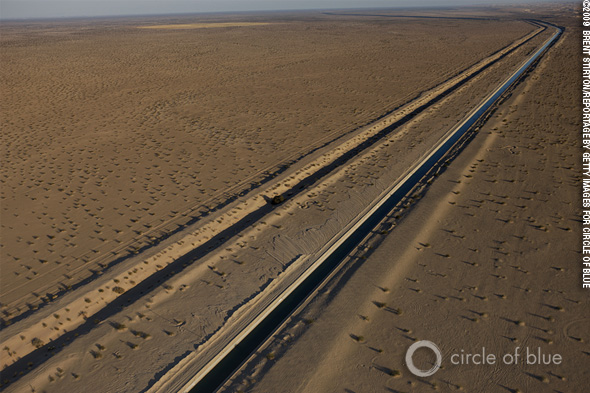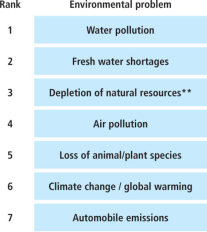

As the world turns its eyes toward Copenhagen for the United Nations Climate Conference in December and how to engage the public on these massively complex issues of planetary survival, it might look to water as a universal solvent. According to our new Circle of Blue GlobeScan public opinion survey, WaterViews, we now know that people globally care most about water.
This seems like commons sense. Water flows through each of world's most significant challenges of the 21st century, from drought and food supplies, health and pandemics to economic despair and sustainable development. And, of course, we'd simply die without water.
This comprehensive and independent global public opinion survey on attitudes about fresh water sustainability, management and conservation finds that people around the world view water issues as the planet’s top environmental problem, greater than air pollution, depletion of natural resources, loss of habitat and even climate change. We published the results Tuesday at World Water Week in Stockholm. (Circle of Blue is the independent, nonpartisan journalism, science and communications organization I direct that's reporting the global water crisis.) The data is fresh and we didn't know the outcome until the numbers were in little more than a week ago.
My colleague Keith Schneider writes:
The fierce impediments to clean water and sanitation, and the millions of premature deaths from water-related disease, are seen as having a greater influence on quality of life and the planet than air pollution, species extinction, depletion of natural resources, loss of habitat and climate change.
Opinion is powerful stuff, and it may be catching up to present-day reality. The encouraging news for those working on water issues is that people — a high 93 percent — want to be empowered with more information to do something about the crisis.
What does this mean? Simple. As an issue, climate is gravely urgent. But it's a surpassingly complicated story built on scenarios and slow fuses. If it can be broken down into its concrete impacts on such things as water, then it becomes understandable and real.
We surveyed 1,000 people in each of 15 countries, and probed 500 in each of the following countries on specific questions: Canada, China, India, Mexico, Russia, the United Kingdom and the United States. (We are awaiting data from ten more countries.) Water pollution and fresh water shortages ranked first and second while climate ranked sixth.

A closer look at the results shows that people around the world view water pollution as the most important facet of the fresh water crisis, and that shortages of fresh water are very close behind. Across the 15 countries surveyed:
- 93 percent say water pollution is a very serious (72 percent) or somewhat serious (21 percent) problem.
- 91 percent believe that a shortage of fresh water is a very serious (71 percent) or somewhat serious (20 percent) problem.
Across the seven focus countries:
- Government is considered among the most responsible for ensuring clean water.
- 78 percent say “solving drinking water problems will require significant help from companies,” indicating that partnerships are an important component to resolving the world’s fresh water sustainability challenges.
- 76 percent say “I need more information to be able to do more to protect water.”
While people around the world agree on the importance of the issue, some key differences between the countries surveyed support the idea that solutions will have to be carefully tailored to local conditions:
- Across the seven countries surveyed, people in Mexico are the most concerned about “lack of water for agriculture” (75 percent are very concerned). People in India are most concerned about “the high cost of water” (60 percent) compared to other countries.
- People in Mexico express the most urgency about the severity of the pollution and water scarcity issues they face, but also the most optimism about their ability to solve the problems.
- In all countries, more than half of those surveyed agree that government is responsible for ensuring clean water. When asked whether individual citizens are responsible, however, responses vary widely by country, from a high of 76 percent in Mexico to a low of 30 percent in China.
In response to the survey data and to gauge the reality of the opinion, we also commissioned some of the world’s best journalists from Contact Press Images and Getty Images to report in pictures and words various facets of the conclusions in seven countries. The front line imagery and stories by Janet Jarman, Ed Burtynsky, Antia Khemka, Brent Stirton, Greg Girard, James Hill, Sam Faulkner are stunning.
Front line reporting, finding the reality in opinion about one of the biggest stories of the 21st century.
The full package — including the data report, images and graphics — is online at Circle of Blue WaterViews.
The independent research and reporting was funded by a grant from Molson Coors Brewing Company..=

